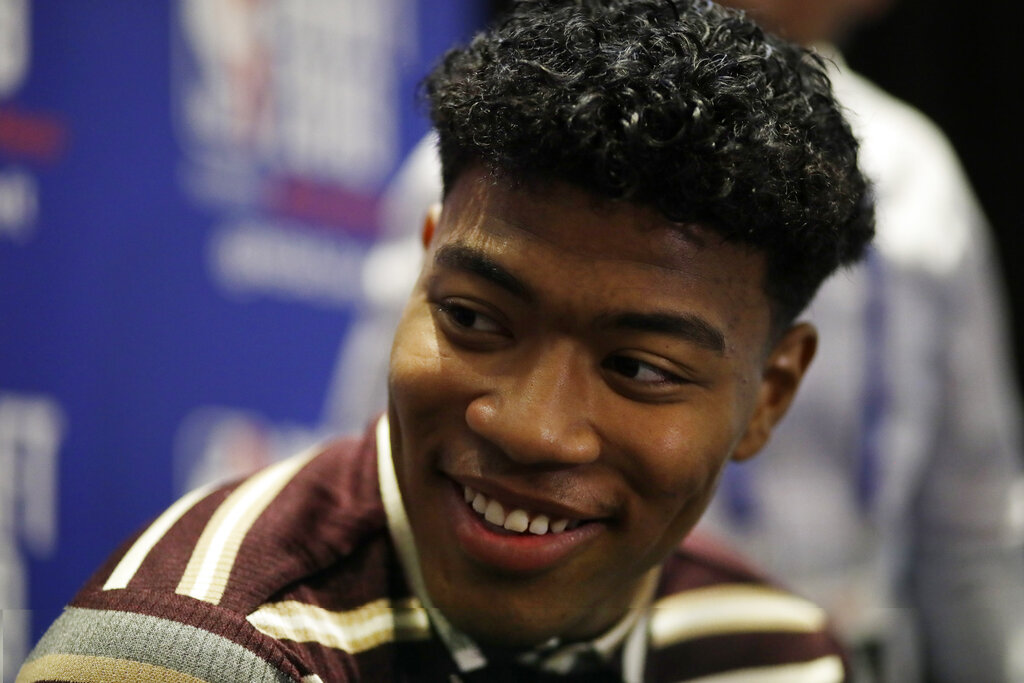
Rui Hachimura, a Gonzaga junior college basketball player from Japan, attends the NBA Draft media availability, Wednesday, June 19, 2019, in New York. The draft will be held Thursday, June 20. (AP Photo/Mark Lennihan)
NEW YORK — Rui Hachimura used to adore a manga and anime series called “Slam Dunk,” which followed a high school basketball team’s trials and tribulations and helped bring the sport into the Japanese consciousness.
Though Hachimura was born in Toyama Prefecture two years after the series ended in 1996, he was still profoundly influenced by its cultural impact.
So was Joji Sakamoto, his coach at Okuda Junior High who told Hachimura after his first practice that he was in for big things on the basketball court — in the United States.
“He pointed at me and said: ‘You’re going to the NBA,'” said Hachimura, the Gonzaga forward who is expected to be the first Japanese-born first-round pick, and just the third to play in the league. “At that time, I was stupid, I believed him. And he was for real, too. He was serious about it. And I really believed him. And I’m really here now. It’s crazy.”
Hachimura had never played basketball before meeting Sakamoto at age 13. Sakamoto entered basketball due in large part to “Slam Dunk.” Hachimura’s teammates, too, were obsessed with the program years after its finale.
“The first wave of basketball in Japan was pushed forward by ‘Slam Dunk,'” said Dexter Thomas, a PhD candidate at Cornell University writing a dissertation on race in Japanese hip-hop and a correspondent on ‘Vice News Tonight.’ “Rui Hachimura, if he succeeds, it’s going to be another level.”
Though basketball is not heavily followed in Japan, exceptional Japanese athletes are, regardless of the sport. So if Hachimura, the West Coast Conference player of the year and a potential lottery pick, is successful, it could help grow the game that figures to get a boost leading into the 2020 Olympics in Tokyo.
“He’s been huge for Japan,” said Gonzaga teammate Brandon Clarke, another projected first-round pick. “He’s just done so much for the country. The fact that he’s going to be drafted in the first round and probably a lottery pick (Thursday), it’ll be really big for the country.”
Hachimura was born to a Beninese father and Japanese mother. The 21-year-old said he faced racism as a child, but added that the perception that Japanese people are racist is generally overblown. Though there are prominent hafus — the term in Japan used for a biracial person — across Japanese society, none has quite the background of Hachimura.
“(Hachimura) doesn’t have somebody that he can point to and be like, ‘I look like him and I could be him.'” Thomas said. “He doesn’t have that, but he could be that for somebody younger. I have a lot of friends who could’ve used someone like Hachimura growing up.”
That’s what Hachimura wants, to be a role model for, in his own words, “blackanese,” like him.
“The half-kids, mixed kids like me, there are a lot of half-black, half-Japanese, they play sports and they’re actually good at it,” Hachimura said. “I think it’s going to be great for them to see.”
Hachimura recognizes the national impact his success can have back home.
“It’s big for the country,” Hachimura said. “It’s big for Japan because we’ve never really had a player like me in Japan playing basketball in the NBA and stuff. It’s going to be big and it’s going to be a dream. It means a lot for me, my family, Japanese basketball — the whole country.”